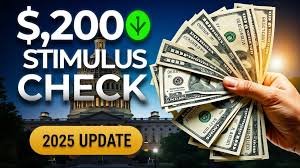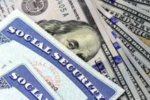Many Americans are eagerly waiting for updates about a potential $2000 fourth stimulus check. With the ongoing challenges many face due to financial hardships, especially among low-income individuals, Social Security recipients, and seniors, rumors about a $2000 stimulus check have spread quickly. However, before you get your hopes up, it’s essential to understand the facts behind these claims.
What is the 4th Stimulus Check?
The idea of a fourth stimulus check, specifically a $2000 payment, has gained attention on social media and various news outlets. This payment is being discussed as part of a proposed plan to help those who are still struggling financially due to inflation, rising costs of living, and other ongoing economic pressures.
However, despite the growing buzz, there is no official confirmation from the government or the Internal Revenue Service (IRS) regarding the release of a fourth stimulus check in 2025. In this article, we’ll take a closer look at what the stimulus payments have looked like in the past, who would be eligible for such payments, and why the rumors about a $2000 check might not be true.
A Brief History of Stimulus Payments
The first round of stimulus payments was released in 2020 under the Coronavirus Aid, Relief, and Economic Security (CARES) Act. This was a response to the COVID-19 pandemic, which led to widespread shutdowns and job losses. The U.S. government provided emergency relief funds to millions of Americans, many of whom were unable to work due to the lockdown.
By the end of April 2020, the IRS and Treasury Department had sent out approximately 160.4 million payments, totaling around $269 billion. This program, aimed at providing immediate relief, helped families pay bills, buy necessities, and stabilize their finances during a time of great uncertainty. However, the program was always intended to address the financial crisis caused by COVID-19, and once the situation started improving, the payments were discontinued.
The Last Stimulus Payment and the End of the Program
The last stimulus payment was issued in March 2021. Individuals received up to $1,400 in this round, and since then, there have been no further payments. With the situation under control and COVID-19 restrictions easing, the federal government ended the stimulus program, signaling that no new payments would be sent out.
Despite this, rumors about a potential $2000 fourth stimulus check have continued to circulate, especially on social media. Many people have expressed the need for more financial assistance due to the rising cost of living. However, these rumors are not backed by any official statements from the U.S. government.
Who Would Be Eligible for the Stimulus Check?
Historically, stimulus checks have been issued to those who meet certain eligibility criteria, which have included factors like income, tax filing status, and age. For example, seniors who are receiving benefits through Social Security or Supplemental Security Income (SSI) may be eligible to receive stimulus payments, as well as low-income individuals and families who qualify based on their annual income.
For those wondering if they could benefit from a potential stimulus check, here are the key eligibility details:
- Senior Citizens: Individuals over the age of 65 who rely on government benefits, such as Social Security or SSI, may be eligible for stimulus checks.
- Low-Income Individuals: People who earn lower wages and struggle to meet basic living expenses are often the focus of stimulus programs.
- Income Limits: In past rounds, single applicants with an annual income of up to $75,000 were eligible, while couples with an income below $150,000 could also qualify for payments.
- Tax Filing Requirements: To be eligible for relief, applicants must have filed taxes for the relevant year. The IRS uses this information to determine eligibility and the amount of payment.
Is the $2000 4th Stimulus Check Really Happening?
The rumors about a $2000 fourth stimulus check have caused confusion. However, there is no official announcement from the federal government confirming such a payment. While the idea of a fourth round of stimulus checks has been suggested by some lawmakers and citizens, there has been no movement on this issue from the IRS or Congress.
Some people may still be holding out hope for a $2000 check, but it’s essential to recognize that no legislation has been passed to provide this. The talk of a fourth stimulus check is merely speculation and not based on any verified information.
Avoid Falling for Scams
As with any situation involving financial relief, there are always individuals looking to exploit the situation. In this case, scammers are taking advantage of the fourth stimulus check rumors by reaching out to vulnerable individuals, particularly seniors, with offers of financial assistance. These scams often involve requests for personal information, such as Social Security numbers, in exchange for fake promises of stimulus payments.
If you receive unsolicited messages or emails asking for your personal information, be cautious. The IRS will never ask for sensitive information through phone calls, emails, or text messages. Always verify the legitimacy of any communication before providing any details.
Conclusion: No $2000 Stimulus Payment for Now
While the idea of a $2000 stimulus check is certainly appealing, there is currently no official plan or confirmation of such a payment from the U.S. government. The past stimulus programs were introduced as emergency measures during the COVID-19 pandemic, and they have since been discontinued. As of now, rumors about a fourth stimulus check are unsubstantiated, and people should be cautious about falling for scams related to these claims.
If you believe you may be eligible for assistance, it’s best to check official government websites, such as the IRS, for accurate and updated information. Be wary of unofficial sources that may be spreading false or misleading information.
Disclaimer – Our team has carefully fact-checked this article to make sure it’s accurate and free from any misinformation. We’re dedicated to keeping our content honest and reliable for our readers.








